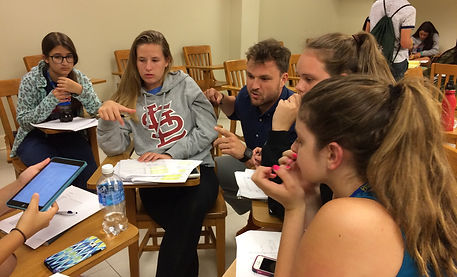
Tobias Lemke
Political Science Ph.D.
Teaching Experience
I began my teaching career in 2015 at the University of Delaware. Here I taught several classes as an instructor of record, including Intro to U.S. Government, U.S. Foreign Policy, Intro to Global Politics and a course on the United Nations. Since 2017, I have also designed and taught political science courses specifically tailored toward an international student population as part of the English Language Institute's Academic Transitions and Accelerate UD programs. This experience was formative in my commitment to teaching courses both accessibly and inclusively, by taking into account the individual skills and challenges students bring into the classroom.

More recently, I have been able to share my experience in course design and delivery as the ELI's Coordinator for Faculty Development and Program Assessment. In this role, I regularly facilitate workshops that share up-to-date findings in the Scholarship on Teaching and Learning (SOTL) and offer instructional support for integrating active learning strategies. In 2021, I also served as Visiting professor at Haverford College (PA) where I taught Intro to International Politics. This fall, I am excited to start the next chapter of my teaching career as a Visiting Professor at Washington College (MD) for the 2022-23 academic year.
Pedagogy & Classroom Practice
My teaching practice centers around two pedagogical approaches in evidence-based teaching. First, I strive to promote an active-learning environment by challenging students to reflect on their own knowledge transformation. One small way to do this is to prompt students to be more intentional in their learning. For that purpose, I generally begin class with a review of our previous discussion and outline the material and learning outcomes we will work on next. The point is to get students in the right mind set to learn.

I also provide regular opportunities for students to review their progress and provide feedback. This can help to increase student ownership during the semester and motivate students to critically reflect on their personal approach to learning more generally.
Another pillar of my teaching practice is a focus on skills-based learning. I want students to expand their academic and professional toolkits in ways that can help them succeed beyond the political science classroom. This includes high-value soft skills like creativity, communication, as well genre-specific writing expertise. In my International Political Economy class, for example, students subscribe to an economic newsletter and then write several policy briefs in which they process, evaluate, and present the information of the newsletter to a target audience. I designate specific class time to review and discuss best practices for analytical brief and memo writing and provide opportunities for students to practice these skills over time.